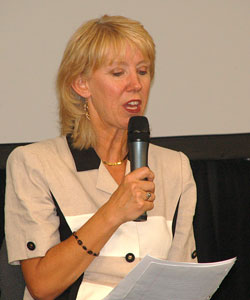 The air we breath is often taken for granted. And, Peggy James, Natural Resources Conservation Service liaison to The Nature Conservancy says, so too are non-profits.
The air we breath is often taken for granted. And, Peggy James, Natural Resources Conservation Service liaison to The Nature Conservancy says, so too are non-profits.
“Non-profits are like air,” Peggy said. “They’re all around us but we hardly notice it. They are an integral part of a healthy, artistic, viably economic, productive society working towards sustainability.”
Sustainability, Peggy says, is crucial to healthy living and, well, feeding and eating, worldwide. She echoed the sentiments of Hugh Hammond Bennett, the man the TNC considers “the original crusader for farmland conservation:”
“For everything we do – all we share, even whatever we amount to as a great people – begins and rests on a sustained productivity of our agricultural lands.”
Peggy adds, that non-profits, are the key to preserving that standard of sustainability. She says the 1.4 million non-profit organizations in the U.S. are growing at a faster rate than the American economy.
“That shows you the vital niche and need that these organizations fill,” Peggy said.
For Peggy, The Nature Conservancy certainly fills a crucial need. With a brief recount from Wellington Brink’s biography on Hugh Hammond Bennett: Big Hugh: The Father of Soil Conservation, Peggy conveyed the harsh consequences of the people of the Western Plains living with uniformed disregard for their environment in the spring of 1935:
“[The people] still searched fruitlessly for an atmosphere clean of flying particles of sand and dirt. Far below them the dust piled ten foot drifts across highways and covered rail lines to slow the movement of freight and passenger trains. Grit ate into motors of trucks and automobiles and seeped through cracks of houses to plague discouraged housewives… In Kansas visibility was sometimes down to less than 300 yards at midday… People lost their way in black blizzards within 100 yards of home… Death rates from pneumonia and other diseases rose rapidly… Gone were the stir of herds and tractors and busy prosperity… this was the Dust Bowl of the early middle thirties… to which the people of the Plains grew more or less inured. “
We’ve come far, Peggy says, from those harsh realities of the thirties. But, she says we can’t forget of the importance for conservation and practicing sustainable agriculture and sustainable living. She calls it a science and an art.
“We define it as the effort to frame social and economic policy so as to preserve the minimum disturbance of the earth’s resources, its inhabitants and environments for the benefit of both present and future generations,” Peggy said.
The TNC consists of one million members and works in 30 countries, protecting 102 million acres around the world with more than 15 million of those acres in the United States. The non-profit also protecs 5,000 miles of rivers worldwide.
“In the thirties, the people were somewhat inured to natural disaster,” Peggy said. “But the people in the 21st century grow more actively involved in conservation locally and globally… We all reap the benefits of a healthy environment.”
You can download and listen to Peggy James’ entire speech at the 2008 Farm Progress Show in Boone, IA here: fp-08-james.mp3
You can also download the speech with this link.
Check out our Farm Progress Show 2008 Photo Album.
AgWired coverage of the 2008 Farm Progress Show
is sponsored by:  and
and 

